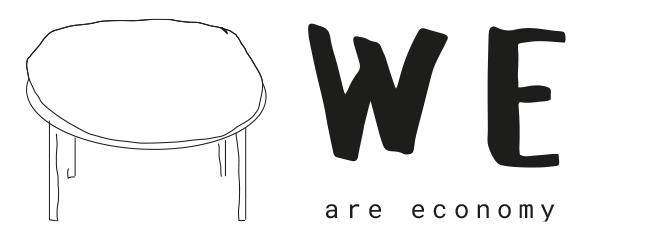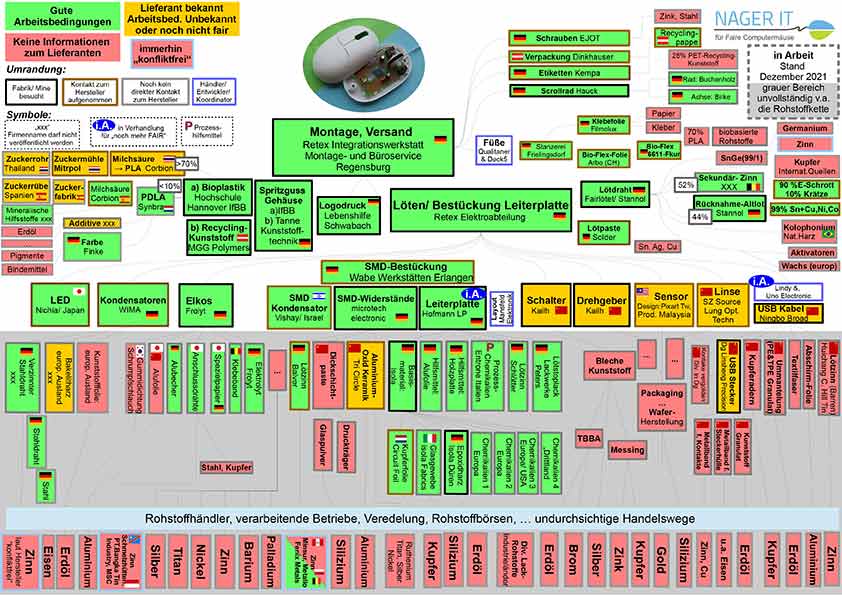The prices we pay for products at the checkouts of supermarkets and online stores lie. The ecological and social costs of overexploitation of people and nature, as is still the case today in the mines, factories and fields of Peru, are outsourced and are not reflected in the prices of the products. The supply chain law recently passed in Germany is intended to remedy this situation. But what are the consequences of the law for people and nature, and why is it so difficult to implement? Using the example of a simple computer mouse, I would like to give you an understanding of the complexity of the issue.
It is actually absurd that in the 21st century it is still necessary to enact a law to protect people against exploitation in the workplace. However, it reflects the sad reality that the observance of human rights is far from being a matter of course in many countries. This is also the case in Peru, where I currently live. Here are just a few examples of this dark side of the economy: Chinese and Western companies are mining copper, silver and gold in Peru. Poisoned water, displacement of people from their homes and inhumane working conditions are only 3 of the consequences for the people who live here. Most of the profits from the raw materials business flow abroad, while the environmental and social costs remain in the country and are socialized. Mining communities such as La Oraya in Peru, which has now been abandoned by the operating companies, are the losers of this system. Today, no one wants to live here anymore, because years of mining have contaminated the soil and water with heavy metals such as sulfur dioxide, lead and arsenic. The mining town of La Oraya, located in the Andes, was listed by Time magazine as one of the most polluted places in the world. About 35,000 people, Time estimates, have been directly affected by years of destruction. Lead is the pollutant that arguably causes the most damage because the effects on children can be so devastating. Here, 99 % of children have blood levels that exceed acceptable limits. The average lead level was three times the WHO limit, according to a 1999 study. Even years after the smelters close, spent lead will remain in the soil of La Oroya for centuries – and there is currently no plan to clean it up. And all this so that we can get cheap metals out of the ground, necessary for the production of a computer mouse, for example.
A step in the right direction with need for improvement
The "Law on Corporate Due Diligence in Supply Chains", as the law is officially called, is intended to ensure that stories like La Oroy's are a thing of the past. The law will come into force in 2023 and will initially cover companies with 3,000 or more employees, and from 2024 companies with 1,000 or more employees. From now on, these companies must identify risks of human rights violations and environmental destruction at direct suppliers and, if necessary, also at indirect suppliers, take countermeasures and document these to the Federal Office of Economics and Export Control (BAFA).
The complexity of a transparent supply chain, even for a simple product like a computer mouse, is demonstrated by the Fair Mouse project, which has since given rise to the Nager IT association. The starting point of the project was the desire to create a 100%ig transparent supply chain using the example of the computer mouse and to produce a mouse that is manufactured without any exploitation in the entire production process. The association is approaching this goal step by step, according to the motto Fairest → Fairer → Fair. At Nager IT, fair means that production takes place without violating human rights and without exploitation (see ILO labor standards). The following graphic shows how difficult this is. Green means, the association has reached its goal. Yellow means that the suppliers are known but it is not clear under which conditions production took place, red means that it has not yet been possible to obtain further information.
The following graphic shows the entire supply chain.
You see, despite years of research, there are still plenty of blind spots in the supply chain. And this is "just" a computer mouse.
It is time for exploitation to become a thing of the past. Germany has committed itself to respecting human rights and to implementing the SDGs (17 sustainable development goals) by 2030. Unfortunately, here too, words are followed far too slowly by deeds. In order to get closer to these goals, transparency and awareness of the problem are needed first. This should be mandatory for all companies. It is not acceptable to shift this responsibility onto the customers. For example, screw manufacturers would then have to ensure the working conditions for their raw materials. The manufacturer of switches would have to ensure the same for his components, and so on. Unfortunately, this is still a long way off and fairness is still the exception, not the rule. But fortunately, there are now pioneering companies in most industries, such as the Fair Mouse producers. Until this has become the norm, we have to vote with our wallets for products that have been produced sustainably and fairly.
____________________________________________
Author: Frank Braun, www.fairbinden.eu
Sources:
Image: https://www.nager-it.de/maus
https://lieferkettengesetz.de/
https://www.unicef.de/informieren/aktuelles/blog/kinderarbeit-fragen-und-antworten/166982
https://www.ecoi.net/en/document/2048739.html
http://content.time.com/time/specials/2007/article/0,28804,1661031_1661028_1661020,00.html
https://www.nationalgeographic.com/history/article/151202-Cerro-de-Pasco-Peru-Volcan-mine-eats-city-environment
https://www.destatis.de/DE/Themen/Wirtschaft/Aussenhandel/Tabellen/rangfolge-handelspartner.pdf?__blob=publicationFile
https://bdi.eu/artikel/news/auf-dem-weg-zu-einem-europaeischen-lieferkettengesetz/
https://peruconsult.de/top-20-die-groessten-unternehmen-in-peru/
https://minsus.net/seminario-analizo-el-impacto-de-las-regulaciones-de-debida-diligencia-en-las-cadenas-de-suministro-en-europa-para-el-sector-minero-de-la-region-andina/

